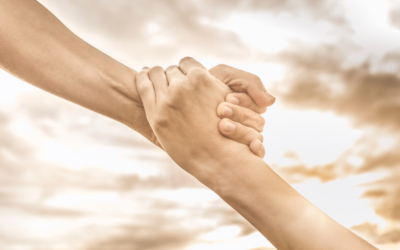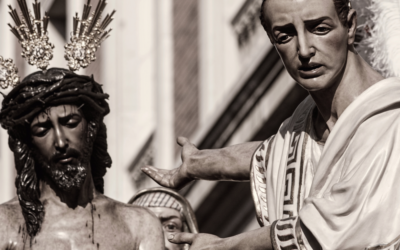Mother’s Day, a holiday celebrated in the United States and other countries, evokes a wide range of emotions. Some women rejoice in this day that recognizes their selfless efforts as mothers—efforts that do not seem to be adequately recognized in today’s world. Others feel pangs of guilt as they catalog their weaknesses while listening to people speak adoringly of their mothers as though they were perfect. Childless women—married or wishing to marry—may feel their aching for motherhood grow. Those who suffered at the hands of abusive mothers may feel a rush of bad memories, and those who lost mothers recently may feel their mourning renewed. Amidst this mixture of emotions, are there principles we can learn from Mother’s Day that can benefit everyone?
Yes.
Birth creates mothers. But there are more births than the one type we typically celebrate on Mother’s Day. Let’s go back to the beginning of human existence and move forward through the five births we must all experience to know true joy. As we do so, let us ponder the blessings of these births and how we can all contribute to advancing the work of our Heavenly Parents, Father and Mother, in bringing to pass the exaltation and eternal life of Their children (Moses 1:39).
The five births we will celebrate are (1) birth as a spirit; (2) physical birth; (3) being born again; (4) the birth we call death; and (5) rebirth through the resurrection.
1. Birth As a Spirit
Human souls consist of a physical body joined with a spirit. Doctrine and Covenants 88:15 tells us that “the spirit and the body are the soul of man.” Both spirits and bodies must be created.
Doctrine and Covenants 93:33 explains that “the elements are eternal.” Our spirits and bodies are both made up of these eternal material elements. Both God and humans have bodies made of tangible materials like “flesh and bones,” as Doctrine and Covenants 130:22 notes. Doctrine and Covenants 131:7‒8 adds that “all spirit” also “is matter, but it is more fine or pure, and can only be discerned by purer eyes; . . . when our bodies are purified we shall see that it is all matter.”
Psalm 90:2 describes God as being “from everlasting to everlasting.” We too are “from everlasting to everlasting” in the sense that the elements forming us are eternal. But at some point, those elements were organized, or made, into spirits. “I am God; I made the world, and men before they were in the flesh,” God told Adam in Moses 6:51. As Elder D. Todd Christofferson of the Quorum of the Twelve reiterated in a general conference address, “God . . . is the Heavenly Father of our spirits.”
And, of course, our Heavenly Father did not create our spirits by Himself. “Perhaps the most important things for us to see clearly are who God is and who we really are—sons and daughters of heavenly parents,” said Sister Michelle D. Craig, First Counselor in the Young Women General Presidency at that same general conference. The Church’s Young Women Theme explicitly declares, “I am a beloved daughter of heavenly parents, with a divine nature and eternal destiny.”
Our creation as a spirit by Heavenly Parents constituted our first birth. Without that birth, we would not have half of our souls, our spirits. We can all be grateful to our Heavenly Father and Heavenly Mother for this great blessing.
2. Physical Birth
But, of course, in order for our souls to be complete, our spirits had to be clothed with bodies. The scriptures talk a lot about this step in our progression. For example, Abraham 4:27 explains, “The Gods went down to organize man in their own image, in the image of the Gods to form they him, male and female to form they them.”
Once the first humans were formed, they “brought forth children; yea, even the family of all the earth,” as we read in 2 Nephi 2:20. All of us humans descend from people born before us. Being on this earth means we can be grateful to birth parents, including an earthly mother who bore us. Whether those birth parents subsequently raised us in whole or in part or gave us to others to raise should not obscure the debt we owe them for our earthly existence. On Mother’s Day, we can all be grateful to our earthly birth mothers for making our life on this planet possible through God’s great plan of happiness.
3. Being Born Again
But, of course, there is more to mothering than just giving birth to children. The children must be nurtured and loved. Most of the time, birth mothers at least start this process, and many times they are the principal caregivers of children. But others also contribute to nurturing children throughout their lives.
My mother was not perfect, but she did her best to raise me and my six siblings and to “bring” us “up in the nurture and admonition of the Lord,” as Ephesians 6:4 and Enos 1:1 encourage. I will eternally be grateful to her and to my dear wife, who brought our six children into the world and has spent decades nurturing them.
Besides partnering with their husbands, both my mother and my wife have enjoyed help from others in raising children. Among those who nurtured me were two single aunts who were like mothers to me. They helped teach me how to walk physically and spiritually, and they supported me in many other ways throughout their long lives. Mother’s Day could be difficult for them, and to avoid the pain, they often skipped church on that holiday.
For one Mother’s Day, the younger of the two, whom we called Aunt Willi, was asked to speak in church and so could not avoid attending. Her single sister, our Aunt Jo, with whom she lived most of her life, reported the circumstances in a family letter written May 24, 1984.
“Since our last letter,” Aunt Jo wrote, “I had to speak in sacrament meeting on Easter Day and in stake conference. Willi spoke on Mother’s Day. When they asked her to speak on mothers, she thought they said others, and was going to talk about us. We have always been recognized as ‘others.’”
Aunt Jo went on to say to her married sisters, “Poor joke. You would have to be single to understand it.”
All of us started life as single persons, and most married persons on earth today will someday be single again through death or divorce. At the April 2021 general conference of the Church, President M. Russell Ballard—President of the Quorum of the Twelve and a widower—directed his remarks toward singles.
“Brothers and sisters,” he pointed out, “more than half of adults in the Church today are widowed, divorced, or not yet married. Some wonder about their opportunities and place in God’s plan and in the Church. We should understand that eternal life is not simply a question of current marital status.”
My single aunts struggled with their singleness but also gave unselfishly to nurture other children of our Heavenly Parents. Late in her life, before dying of pancreatic cancer, Aunt Willi said, “My patriarchal blessing, that I received when I was seven years old, said to be a mother was my chief calling. And I would sit there, and I’d think—especially after the hysterectomy—‘I’m never going to be a mother.’ But I can see that you can be in another way. I guess that’s what we had to do.”
As the beneficiary of their unselfish love and service, I can testify that they did indeed do that, and I am eternally grateful to them for it.
I also have a stepmother, a woman my father married late in life after my birth mother died. My stepmother continues to provide love and support to me and my siblings even in our advanced years. Stepmothers supplement and need not displace birth mothers.
Sister Kristen McMain Oaks, second wife of President Dallin H. Oaks, provides a wonderful example of this. “I came into a large, loving family who still adored their mother, who still had tender hearts from her loss,” she explained. “I worked to keep June [their birth mother] a part of our family. Every memory, tradition, recipe, and conversation my family wished to have of her I embraced and encouraged.” (Richard E. Turley Jr., In the Hands of the Lord: The Life of Dallin H. Oaks, 259‒60.)
In today’s world, we frequently hear that it takes a village to raise a child. Latter-day Saints have long known that wards and branches, stakes and districts, missions and missionaries, teachers and leaders, as well as Church members who minister in myriad ways, all contribute to nurturing the children of God.
This suggests that all of us can assist in and enjoy the blessings of the third birth, the one Jesus described to Nicodemus in the New Testament. “Except a man be born again,” Jesus said in John 3:3, “he cannot see the kingdom of God.” When Nicodemus sought clarification, Jesus said in verse 5, “Except a man be born of water and of the Spirit, he cannot enter into the kingdom of God.”
As the Lord earlier told Alma the Younger, “All mankind, yea, men and women, all nations, kindreds, tongues and people, must be born again; yea, born of God, changed from their carnal and fallen state, to a state of righteousness, being redeemed of God, becoming his sons and daughters” (Mosiah 27:25).
All of us should ask ourselves, as Alma did those he taught, “Have ye spiritually been born of God? Have ye received his image in your countenances? Have ye experienced this mighty change in your hearts?” (Alma 5:14.)
If we can answer yes, we can help others received this same blessing of spiritual rebirth. Although the Spirit does the converting, we can be God’s instruments to provide good conditions in which the Spirit can operate.
And we don’t have to be a missionary or other called teacher to do this. Relatives, friends, fellow Church members, and neighbors can all contribute.
In my last ward, two single women in their nineties inspired me nearly every time I went to Church. Physically, they had significant limitations. But spiritually, they exuded faith, and they frequently testified in ways that touched me personally. Their example of faithful living in the face of life’s challenges inspired me.
4. The Birth We Call Death
The fourth birth, the sobering one we call death, is the separation of the body from the spirit. In 2 Nephi 9:6, Jacob explains that “death hath passed upon all men, to fulfil the merciful plan of the great Creator.” In Alma 40:11, we read that “the spirits of all men, as soon as they are departed from this mortal body, . . . whether they be good or evil, are taken home to that God who gave them life.” We know from other revelations, such as Doctrine and Covenants 138, that work for the deceased continues in the afterlife.
How do we aid the Lord in this birth we call death? First, just as we have doctors, midwives, nurses, and others who help bring children into the world, we also have those who care for persons who are about to die, easing their pain and making their passing as sweet and peaceful as possible.
I have watched in grateful wonder as loving nurses, doctors, friends, relatives, and hospice workers have attended to my mother, my mother-in-law, my aunts, and other family members as they prepared to leave this life and be born into the next. I am grateful for the selfless love and concern of these caregivers at this sobering and sacred time. There are many in the final years of life who benefit from the selfless service of others, a kind of service we can all give.
For those who have already passed through the veil, we can engage in family history and temple work to help those needing spiritual assistance before the final birth. The positive eternal impact of this work is difficult to overstate.
5. Rebirth in the Resurrection
The final birth is the resurrection. In the spirit world, Doctrine and Covenants 138:50 tells us, “the dead” see “the long absence of their spirits from their bodies as a bondage.” They have looked forward to the time when they could be freed from that bondage. For according to Doctrine and Covenants 93:33‒34, “spirit and element, inseparably connected, receive a fulness of joy; and when separated, man cannot receive a fulness of joy.”
In our final birth, the resurrection, according to Doctrine and Covenants 138:17, “the spirit and the body” will “be united never again to be divided, that they might receive a fulness of joy.”
For this great blessing, made possible by the atonement of Jesus Christ, we can all be grateful.
Conclusion
On Mother’s Day, may we all remember the mothers who gave us birth: spiritual, physical, emotional, and in other ways. And may we seek to be instruments in God’s hands, through the atonement of Jesus Christ, in bringing our Heavenly Parents’ children back into their presence to enjoy exaltation and eternal life. As we do so, may Mother’s Day be for us a time of gratitude and service, a time to reflect and find opportunities to do good.



